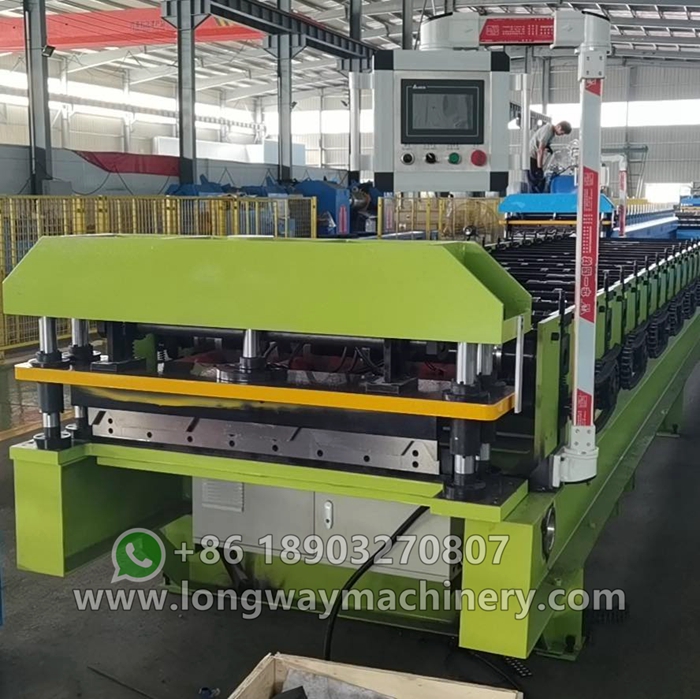custom metal stud roll forming machine
Understanding Custom Metal Stud Roll Forming Machines
In today's construction industry, efficiency and precision play critical roles in ensuring the smooth development of structures. One pivotal technology that has emerged to uphold these needs is the custom metal stud roll forming machine. These machines revolutionize the way metal studs—essential components for framing in building construction—are manufactured, offering a host of advantages that cater to both specific client requirements and broader market demands.
What is a Roll Forming Machine?
A roll forming machine is a piece of equipment that processes metal sheets into defined shapes by continuously feeding them through a series of rollers. Each roller in the setup makes incremental changes to the metal's shape, ultimately forming it into a desired profile. Metal stud roll forming machines are specifically designed to produce metal studs, which are long, thin strips of metal that serve as the skeletons for walls, ceilings, and other structural components.
Customization is Key
One of the primary benefits of using a custom metal stud roll forming machine is the ability to tailor the products to precise specifications. Builders often face unique challenges that standard materials cannot address. The flexibility of these roll forming machines allows manufacturers to produce components that meet specific dimensions, gauges, and strengths, all crucial for specialized applications. This customization can include variations in stud spacing, depth, and web thickness, ensuring that the final product suits unique engineering requirements.
The Manufacturing Process
The manufacturing process begins with high-quality metal coils, typically made of galvanized steel, which offers durability and resistance to corrosion. The coils are fed into the roll forming machine, which consists of several sets of rollers. Each roller is meticulously designed to shape the metal gradually, ensuring accuracy and consistency through each pass. As the metal traverses through the machine, it undergoes cold forming, a process that maintains its integrity without compromising its strength.
After the rolling process, the metal studs can undergo additional treatments to enhance properties such as conductivity or even aesthetics, depending on their end use. The flexibility of this process makes roll forming machines an excellent choice for both large-scale operations and smaller custom projects.
custom metal stud roll forming machine

Efficiency and Cost-Effectiveness
Compared to traditional manufacturing methods, roll forming is notably efficient. The continuous process minimizes waste and maximizes output, making it a cost-effective solution for fabricators. Custom metal stud roll forming machines are designed for high-speed production, allowing for rapid turnaround times without sacrificing quality. This efficiency not only meets the demands of fast-paced construction projects but also offers significant financial benefits to manufacturers, who can lower their overall production costs.
Environmental Considerations
In an age where sustainability is a paramount concern, the roll forming process stands out. The ability to recycle scrap material dramatically reduces waste, making this method environmentally friendly. Moreover, the durability of the metal studs produced ensures long-lasting applications, reducing the need for replacements and contributing to sustainable building practices.
Applications of Custom Metal Studs
The applications for custom metal studs are vast. They are widely used in commercial and residential construction projects—serving as framing for walls, ceilings, and partitions. Additionally, they are employed in various sectors, including healthcare, education, and hospitality, where specifications may vary significantly depending on the intended use of the space.
Conclusion
As the construction industry continues to evolve, the demand for customized solutions will only increase. Custom metal stud roll forming machines embody the intersection of technology and manufacturing, providing builders with the tools they need to create structures that are safe, durable, and tailored to their needs. The ability to customize, combined with the advantages of efficiency, cost-effectiveness, and environmental responsibility, positions these machines as integral components in the future of construction. For architects and builders seeking innovative ways to optimize building processes, investing in custom metal stud roll forming technology will undoubtedly yield significant dividends.
-
Roof Panel Machines: Buying Guide, Types, and PricingNewsJul.04, 2025
-
Purlin Machines: Types, Features, and Pricing GuideNewsJul.04, 2025
-
Metal Embossing Machines: Types, Applications, and Buying GuideNewsJul.04, 2025
-
Gutter Machines: Features, Types, and Cost BreakdownNewsJul.04, 2025
-
Cut to Length Line: Overview, Equipment, and Buying GuideNewsJul.04, 2025
-
Auto Stacker: Features, Applications, and Cost BreakdownNewsJul.04, 2025
-
Top Drywall Profile Machine Models for SaleNewsJun.05, 2025








